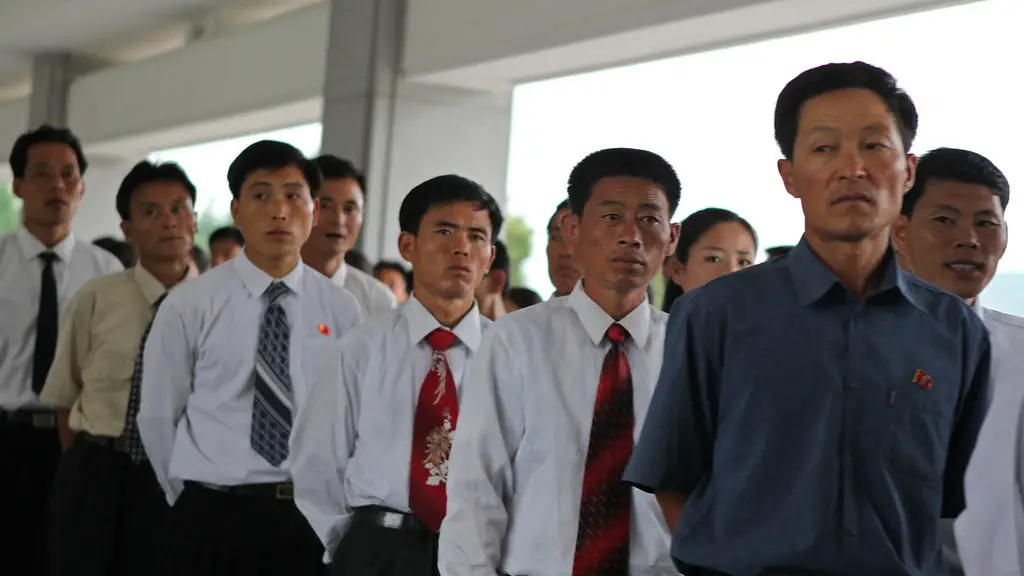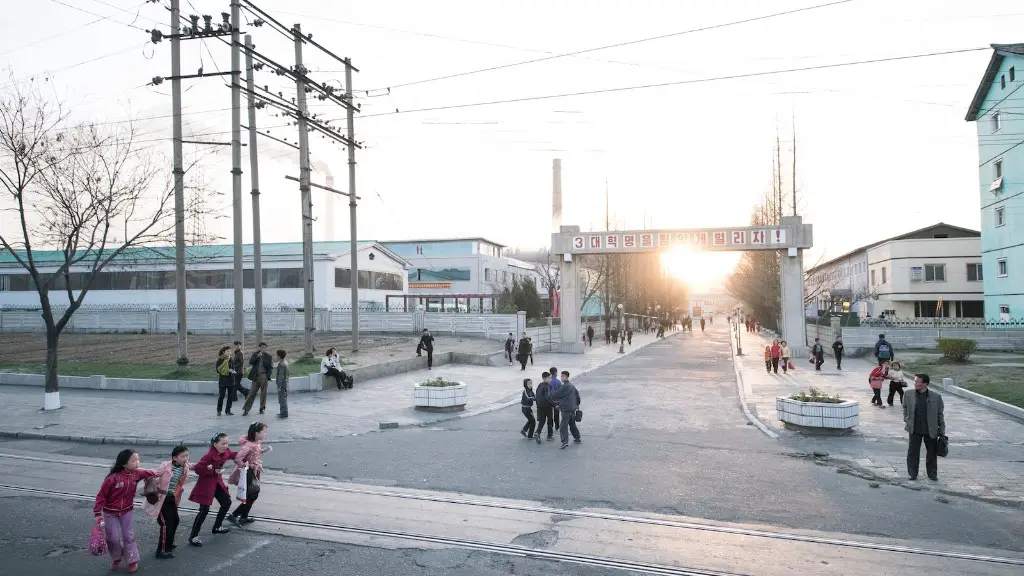Background Information
North Korea and South Korea have been at odds since the end of World War II. North and South were divided in 1945 as a result of a U.S. occupation and Japanese withdrawal. In 1948, two conflicting governments were formed in North and South Korea. The North established a totalitarian socialist regime under the leadership of Kim Il Sung, while the South established a western-style democratic government. In 1950, North Korea invaded South Korea in an attempt to reunite the countries under its rule. This sparked the three-year Korean War, and ultimately led to a ceasefire agreement in 1953.
Since then, the two countries have been locked in a perpetual state of hostilities. Tensions have been repeatedly inflamed by North Korea’s nuclear weapons development and its human rights abuses. In 2018, North Korea declared that it was open to reunification with the South, but a formal agreement has yet to be reached.
Relevant Data
The animosity between the two neighbours is long standing and deep rooted. This has been exacerbated by the fact that South Korea is an economically and militarily powerful nation while the North is ailing economically and heavily reliant on foreign aid. It is estimated that South Korea is 45 times richer than the North. In addition, South Korea is a close ally of the United States and other Western countries. To North Korea’s authorities, this close relationship poses a direct threat to its own power.
Furthermore, North Korea is deeply paranoid of outside influence and is wary of any reconciliation plans that could potentially disrupt its grip on power. As a result, North Korea has developed a nuclear weapons programme to deter outside intervention. This, in turn, has been met with international condemnation and sanctions from the United Nations.
Expert Perspective
According to experts, the fight between the two Koreas is rooted in a combination of ideological differences, economic disparities and geopolitical rivalries. The long standing animosity between the two countries has been exacerbated by the nuclear arms race and the failure to reach any meaningful reunification agreements. Experts agree that the most effective way of achieving a resolution is through diplomacy and dialogue rather than force or aggression.
“The only answer we have for this problem is to get our allies to come together to put pressure on the North Korean regime to move toward a resolution,” says Thomas McDonnell, a political analyst. “It’s going to require everyone involved to come to the table, work together and be willing to make compromises.”
Pursuit of Power
At the heart of the North-South conflict is the North Korean regime’s pursuit of power. North Korea wants to protect its own power and determination to remain a totalitarian state. This is why it has invested so heavily in its nuclear programme, as it believes that this will deter the United States and other Western countries from intervening in the region.
The North Korean authorities have also sought to maintain control over its people by cracking down on dissent and blaming the South for all of its economic and political problems. This has led to a growing mistrust between the two nations and a reluctance to engage in any meaningful dialogue.
Analysis and Insights
The fight between the two Koreas is complex and multi layered. With the threat of nuclear war always looming, it is essential that the international community comes together to find a diplomatic solution to the conflict.
It is clear that the North Korean authorities want to protect their power, and they will continue to resist any attempts to compromise this. Therefore, international pressure is key in order to convince the North to come to the negotiating table.
Moreover, it is also imperative that the South Korean Government makes concerted efforts to address the wide economic and political disparities between the two nations. It is only once these issues have been addressed that any meaningful agreement can be reached.
Domestic Concerns
The domestic population of both nations is also deeply concerned about the state of their relationship. In South Korea, there is a fear of a potential attack, while in the North, there is a fear of a potential invasion by the United States and other Western countries.
Both North and South view the other as an existential threat, and this has pushed them further apart. It is only through meaningful dialogue and a commitment to the peaceful reunification of the two states that the two sides will be able to move forward.
Perception Gap
The perception gap between the two Koreas is vast. North Korea has been demonised in the Western media and this has created a skewed view of the situation in the minds of many South Koreans. Conversely, the North is deeply suspicious of the South and perceives it as an enemy.
This has had a profound impact on both sides’ willingness to engage in meaningful dialogue. It is only through a greater understanding of the other’s perspective that trust can be built and diplomatic progress made.
Reunification Plans
The long standing animosity between the two Koreas has meant that any attempts at reunification have been met with deep suspicion and mistrust. North Korea is unwilling to make any concessions that could potentially weaken its grip on power, while South Korea is wary of any agreements that could potentially compromise its own position.
Nonetheless, in recent years there have been promising initiatives that could lead to a rapprochement. In 2018, South Korea proposed a reunification plan that called for increased cultural and economic exchanges and the eventual reunification of the two countries.
This was met with a positive response from the North, but no meaningful progress has been made since then. To make further progress, both sides must set aside their differences and make efforts to build trust and understanding.
Participation of World Superpowers
The situation in the Korean peninsula is highly complex and it is not only down to the two Koreas to come to a resolution. It is essential that the international community, particularly the United States and its allies, play a constructive role in the process.
At present, the United States is acting as a mediator between the two Koreas and is pushing for a peace treaty that would bring a formal end to the conflict. The participation of the international community is essential for any meaningful progress to take place.
In addition, it is important that economic sanctions are lifted and international aid is provided to the North in order to help it address some of its most urgent social and economic issues. Such measures could be key to fostering a more cordial relationship between the two countries.
Human Rights Abuses
Finally, it is also important to address the human rights abuses that are taking place in North Korea. The North Korean regime has been criticised for its mistreatment of political dissidents and media censorship. Such abuses must be addressed if the two countries are to make any meaningful progress.
The international community must put pressure on the North Korean authorities to put an end to these abuses and ensure that its people have the same basic rights as those in the South. Only by doing this can a truly peaceful resolution be found.


